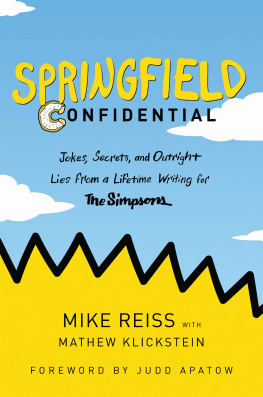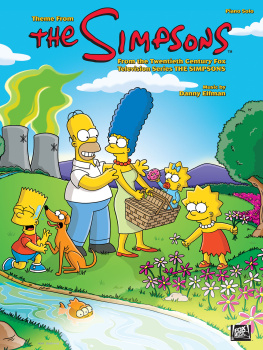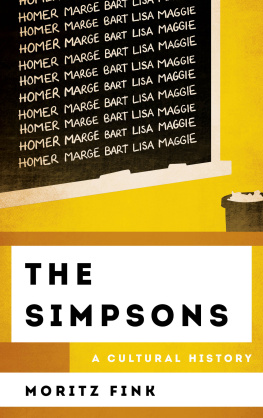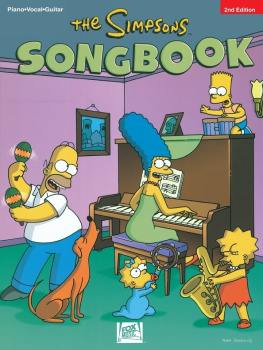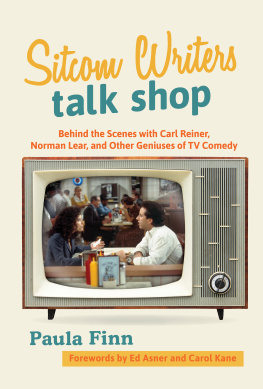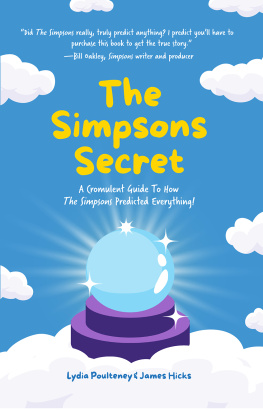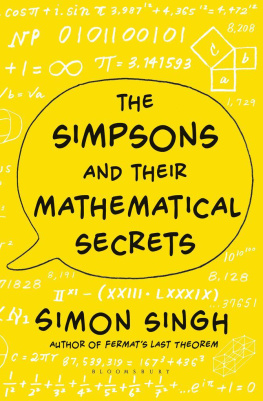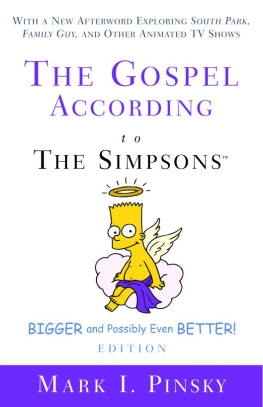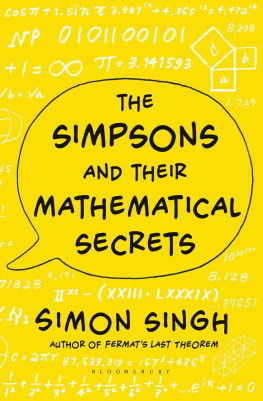Contents
Guide
SPRINGFIELD CONFIDENTIAL . Copyright 2018 by Reiss Entertainment, Inc. All rights reserved under International and Pan-American Copyright Conventions. By payment of the required fees, you have been granted the nonexclusive, nontransferable right to access and read the text of this e-book on-screen. No part of this text may be reproduced, transmitted, downloaded, decompiled, reverse-engineered, or stored in or introduced into any information storage and retrieval system, in any form or by any means, whether electronic or mechanical, now known or hereafter invented, without the express written permission of HarperCollins e-books.
Cover design by Owen Corrigan
FIRST EDITION
Digital Edition JUNE 2018 ISBN: 978-0-06-274804-1
Version 04302018
Print ISBN: 978-0-06-274803-4
To Matt Groening, Jim Brooks, and Al Jeanthanks for the greatest job in the world. Dont fire me.
Mike Reiss
Welcome to the humiliating world of professional writing.
Homer Simpson
Contents
In the early 90s I was a comedian and an aspiring writer. I made my living in three ways: During the day, I worked for Comic Relief, producing benefits for the homeless at comedy clubs, for which I was paid $200 a week. I did stand-up comedy at the Improv and on the road. And I wrote jokes for other comedians, such as Roseanne Barr, Tom Arnold, Jeff Dunham, George Wallace, Taylor Negron, and Garry Shandling.
I was looking for my big break and it was not coming. Some of my friends were able to get jobs as staff writers on the TV show Roseanne, but I couldnt seem to make that happen. Some of my other friends, such as David Spade and Rob Schneider, and later Adam Sandler, were hired to be writer/performers on Saturday Night Live, but I was never able to get them to hire me. Jim Carrey used to pay me out of his own pocket to write sketches with him for In Living Color, but I could never turn that into an official staff job.
I was frustrated and needed to make a move, so I decided to write a spec script, which is basically a sample of writing, in the hopes of getting hired to write for a sitcom. My two favorite television programs at the time were The Simpsons and Chris Elliotts Get a Life. I sat down over the course of a month or two and wrote one spec episode of each program. At the time, I thought they came out really well, but when I sent them around town, I didnt get hired by any of the shows I applied to and was only able to get one meeting, which was with David Mirkin at Get a Life, but I think I only got that meeting because Garry Shandling forced him to meet with me.
The only other feedback I got about my two spec scripts was from Mike Reiss and Al Jean, who were running The Simpsons. I was told that they had liked my scripts, but they didnt need any writers at that moment. Even though it was a rejection, it did give me some self-esteem. The writers of my favorite show had said something positive. That wouldnt pay my rent, but it was much better than the reaction I had gotten from every other show on television at the time, which was silence.
Being unable to find a staff job, I started working on a variety of projects, eventually including The Ben Stiller Show. After the show was canceled, which was just a few months into our run, I got a call from Mike Reiss who told me that he and Al were creating a new show called The Critic, and he wanted to know if I would like to join their staff. I couldnt believe it. He wasnt just being nice when hed said he liked my Simpsons spec. And twenty-two years later, Mike and Al called me and said they wanted to turn that spec into an actual Simpsons episode.
I re-read it and it was pretty weak, with a few moments of promise. The fact that Mike could see that promise in me when I was still a kid and that he was excited about it was career-changing for me. I certainly didnt deserve to be in that room. I didnt know anything about writing stories. I hadnt earned my way in. But he saw something in me and was very enthusiastic about my writing and my career. When youre young, youre so thrilled to get a job that you dont think much about what an incredibly giving gesture it is for someone to champion you and open that door for you.
When I was sitting in the writers room of The Critic, I was aware that I was sharing that space with some of the best comedy writers in the world. I was in awe on a daily basis. Most of all, I was in awe of Mike, who was endlessly funny and kind. Always in a great mood, hed pitch line after line and was so funny that it made me scared to pitch at all, but I forced myself to and got an amazing comedy education from Mike, Al, and James Brooks. I have read and watched everything Mike has created, and he is an inspiration as a brilliant comic mind and as a genuinely fantastic person who has done nothing but make earth a happier place to live. God bless Mike Reiss.
Judd Apatow
As good a place as any to start...
Since season one, January 1990, each Simpsons episode begins with a joke that is missed by tens of millions of fans in hundreds of millions of viewings. When the Simpsons title card emerges from the clouds, you see the first half of the familys name, The Simps, before the rest of the word. So what? Well, Simps, is short for simpletonsstupid peoplelike the ones youre about to see in the show. If you never caught this, dont feel bad; most of our current staff didnt know it, either.
(Other jokes you may have missed in life: Toy Story is a pun on toy store; the comedy Legally Blonde is a play on that hilarious term legally blind; and theres a 31 hidden in the BR logo of Baskin-Robbins, referring to their 31 flavors slogan. Youve already learned four things, and this is just page 1!)
At The Simpsons, we put as many jokes in our opening credits as some sitcoms put into an entire episode (or all eight seasons of Home Improvement). Our credits always open with a new chalkboard gag, where Bart writes a phrase repeatedly on the school blackboard, such as NERVE GAS IS NOT A TOY . And they always close with our couch gag, where the Simpsons pile onto the sofa and something surprising happens (e.g., the couch eats them). When the show went to hi-def in 2009, we added more gags: a fly-by (some Simpsons character zooms past the title in a weird contraption) and a video billboard. Lisas sax solo in the theme also changes from week to week; lately, it hasnt always been a saxweve also had her play the harp and theremin.
This whole idea for ever-changing credits came from an unlikely source: the 1950s Mickey Mouse Club. Its opening credits always ended with Donald Duck hitting a gong, and something catastrophic happening: the gong would explode, or Donald would vibrate uncontrollably... there were many variations, but they all ended with a duck getting maimed.
Our first chalkboard gag was simple and self-referential: I WILL NOT WASTE CHALK . Great joke. But it went downhill fast from there: two episodes later the phrase became I WILL NOT BURP IN CLASS . While there have been plenty of good ones ( BEANS ARE NEITHER FRUIT NOR MUSICAL ), these gags are very hard to write because anything longer than ten words goes by too fast to read. Furthermore, when we drop them from the opening credits, which we do more and more, nobody complains. In fact, sixteen years ago we already had Bart writing on the chalkboard NOBODY READS THESE ANYMORE .

